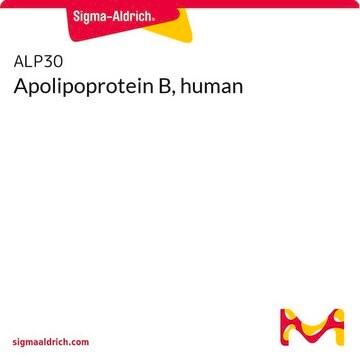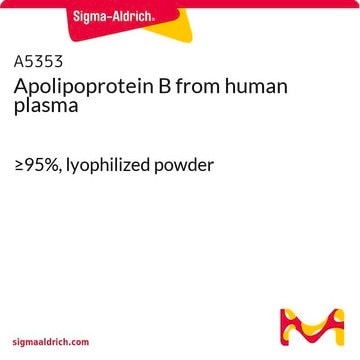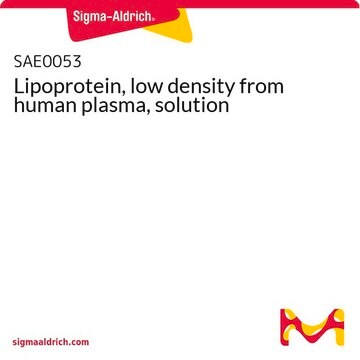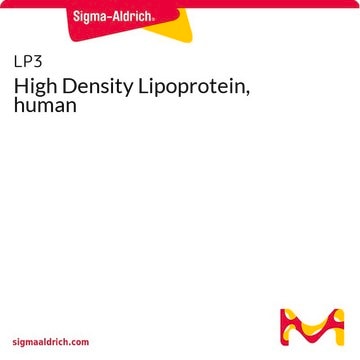178456
Apolipoprotein B, Human Plasma, Low-Density Lipoprotein
Native apolipoprotein B from human plasma. It is a dominant protein constituent of LDL and VLDL. Acts as a ligand for LDL receptor, directing clearance of LDL from plasma to the liver.
Synonyme(s) :
Apo B, Apo B-100
Se connecterpour consulter vos tarifs contractuels et ceux de votre entreprise/organisme
About This Item
Code UNSPSC :
12352202
Nomenclature NACRES :
NA.25
Produits recommandés
Niveau de qualité
Essai
≥95% (SDS-PAGE)
Forme
solid
Fabricant/nom de marque
Calbiochem®
Conditions de stockage
OK to freeze
Conditions d'expédition
ambient
Température de stockage
−20°C
Description générale
Native apolipoprotein B from human plasma. Native apoplipoprotein B from human plasma. Dominant protein constituent of LDL and also present in VLDL. Ligand for the LDL receptor, directing clearance of LDL from plasma to the liver. Functions as a cofactor in enzymatic reactions. Produced by the liver. Mean serum concentration: 950 µg/ml.
Native apolipoprotein B from human plasma. Produced by the liver, and is a dominant protein constituent of LDL that is also present in VLDL. Ligand for LDL receptor, directing clearance of LDL from plasma to the liver. Functions as a cofactor in enzymatic reactions. Mean serum concentration: 950 µg/ml. Higher levels are reported in familial hyperlipidemia, obesity, and diabetes.
Avertissement
Toxicity: Standard Handling (A)
Forme physique
Lyophilized from 50 mM Na₂CO₃, 50 mM NaCl, 10 mM sodium deoxycholate, pH 10.0.
Notes préparatoires
Prepared from plasma that has been shown by certified tests to be negative for HBsAg and for antibodies to HIV and HCV.
Reconstitution
Following reconstitution, aliquot and freeze (-20°C). Stock solutions are stable for up to 3 months at -20°C.
Please refer to the label for lot-specific reconstitution volume.
Autres remarques
Jiang, X.C., et al. 2001. Nat. Med.1, 847.
Zhou, M., et al. 1995. J. Biol. Chem.270, 25220.
Sivaram, P., et al. 1993. J. Biol. Chem.269, 9409.
Sato, R., et al. 1990. J. Biol. Chem. 265, 11880.
Zhou, M., et al. 1995. J. Biol. Chem.270, 25220.
Sivaram, P., et al. 1993. J. Biol. Chem.269, 9409.
Sato, R., et al. 1990. J. Biol. Chem. 265, 11880.
Informations légales
CALBIOCHEM is a registered trademark of Merck KGaA, Darmstadt, Germany
Clause de non-responsabilité
Ce produit, destiné à la recherche scientifique, est soumis à une réglementation spécifique en France, y compris pour les activités d′importation et d′exportation (Article L 1211-1 alinéa 2 du Code de la Santé Publique). L′acheteur (c′est-à-dire l′utilisateur FINAL) est tenu d′obtenir une autorisation d′importation auprès du ministère français de la recherche, mentionné à l′article L1245-5-1 II du Code de la Santé Publique. En commandant ce produit, vous confirmez détenir l′autorisation d′importation requise.
Code de la classe de stockage
11 - Combustible Solids
Classe de danger pour l'eau (WGK)
WGK 1
Point d'éclair (°F)
Not applicable
Point d'éclair (°C)
Not applicable
Certificats d'analyse (COA)
Recherchez un Certificats d'analyse (COA) en saisissant le numéro de lot du produit. Les numéros de lot figurent sur l'étiquette du produit après les mots "Lot" ou "Batch".
Déjà en possession de ce produit ?
Retrouvez la documentation relative aux produits que vous avez récemment achetés dans la Bibliothèque de documents.
Hyo Joon Kim et al.
Clinical science (London, England : 1979), 130(2), 105-116 (2015-11-01)
Although apolipoprotein B100 (ApoB100) plays a key role in peripheral fat deposition, it is not considered a suitable therapeutic target in obesity. In the present study we describe a novel ApoB100 mimotope, peptide pB1, and the use of pB1-based vaccine-like
Andrzej S Pitek et al.
PloS one, 7(7), e40685-e40685 (2012-07-26)
It is now well established that the surface of nanoparticles (NPs) in a biological environment is immediately modified by the adsorption of biomolecules with the formation of a protein corona and it is also accepted that the protein corona, rather
Notre équipe de scientifiques dispose d'une expérience dans tous les secteurs de la recherche, notamment en sciences de la vie, science des matériaux, synthèse chimique, chromatographie, analyse et dans de nombreux autres domaines..
Contacter notre Service technique